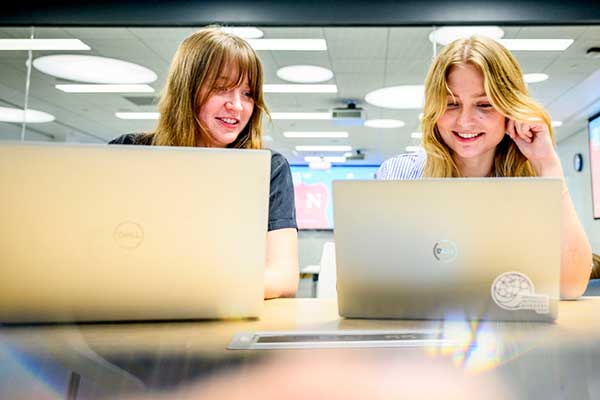Engineers Without Borders Making a Difference in Uganda and Panama

Bioengineering students Casey Laguna, E’26, and Elizabeth-Anne Burgett, E’26, are members of Engineers Without Borders at Northeastern. Currently, they are working on an impactful project to build water distribution systems in Panama and Uganda.
This article originally appeared on Northeastern Global News. It was published by Tanner Stening. Main photo: Casey Laguna and Elizabeth-Anne Burgett, members of the Engineers Without Borders Club, are working on projects in far-flung parts of the world. Photo by Matthew Modoono/Northeastern University.
How one club is making a difference in Uganda and Panama
Casey Laguna has had a lot on her plate lately.
In addition to the rigorous coursework accompanying her final year at Northeastern University, the fourth-year bioengineering student and her peers oversee projects to build water distribution systems in Panama and Uganda.
It’s part of her mandate as the head of the Engineers Without Borders, Northeastern University’s Student Chapter. Established in 2004, the student-led organization’s goal is to help communities in developing countries get access to basic human needs.
Laguna says it’s been a lot of hard work and responsibility — technical, community-focused and deeply gratifying.
“Most of my work is coming in now,” Laguna says. “I probably spend another five to 10 hours a week on the club, but it’s much more on the administrative side of things and making sure that everybody is functioning to the best of their abilities.”
In addition to the task of building these complex systems, the students get to develop deep and sometimes lasting bonds with those communities, says Elizabeth-Anne Burgett, who was a co-lead, alongside Laguna, of the Uganda project.
“This club to me is community at its fullest,” says Burgett, the club’s vice president of development. “The people I’ve met in Boston are some of my closest friends.”
Burgett traveled to Uganda in 2023, and now manage the projects remotely on the Boston campus. The club also has a project in Guatemala, where a separate team is designing and constructing a school building and latrines for 50 schoolchildren.
In helping to deliver these projects, the club follows certain design standards and principles laid out by the national Engineers Without Borders USA chapter. The team is currently working on submitting a suitable design for a system capable of servicing 4,000 community members in Nakyenyi, Uganda, and 250 people in La Pedregosa, Panama.
The time commitment ebbs and flows depending on the project stage, but it often involves managing responsibilities, contracts and communication just as much as design work, the pair say.
While they’re on site, the club conducts water quality testing and assesses current water sources. A key part of their work involves “PMEL” — planning, monitoring, evaluation and learning — which means engaging with community members to understand their daily needs.
Read full story at Northeastern Global News